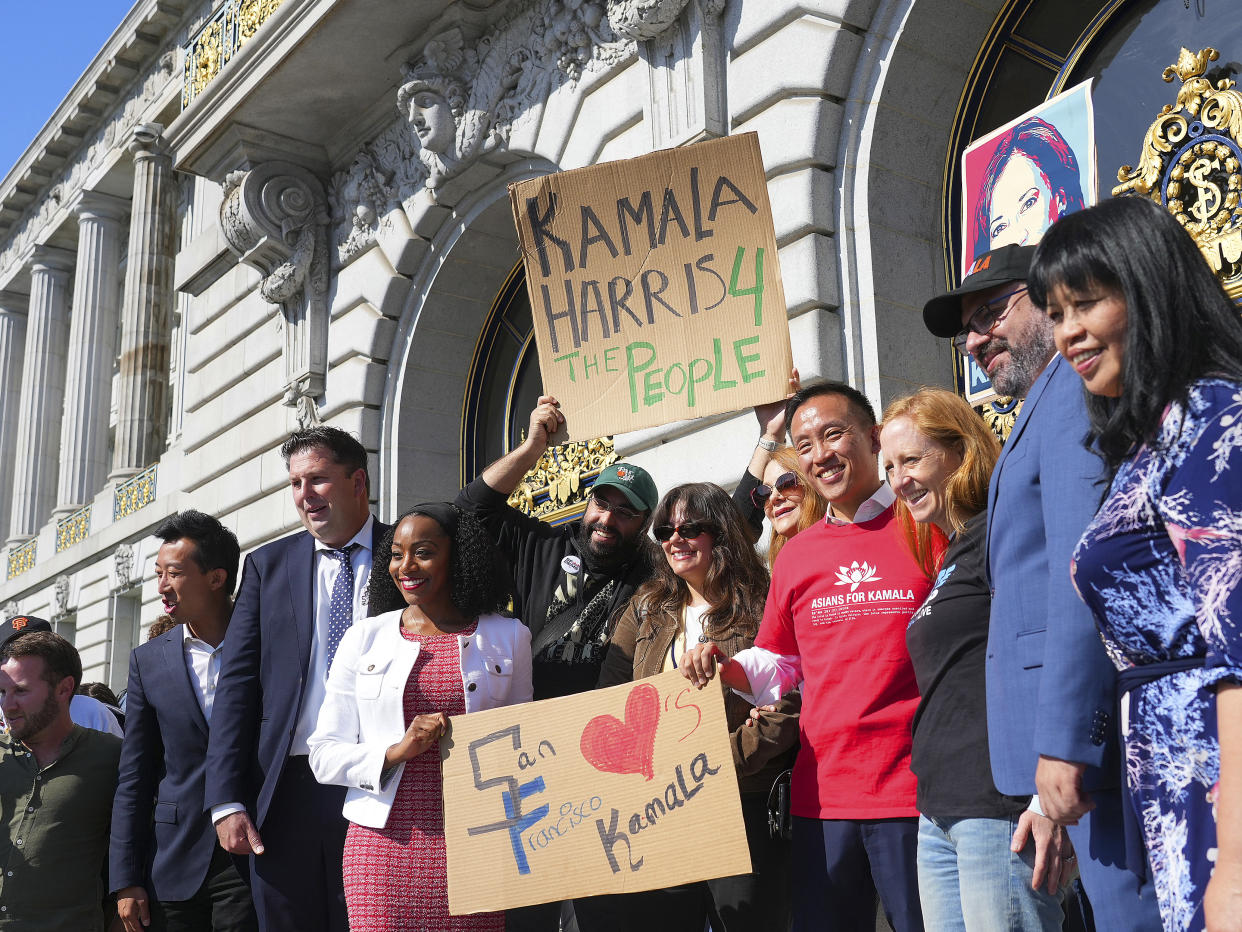Harris Looks to Maintain Momentum as ‘Honeymoon Phase’ Winds Down

- Oops!Something went wrong.Please try again later.
- Oops!Something went wrong.Please try again later.
When President Joe Biden said he would drop out of the presidential race just over a week ago, throwing his support behind Vice President Kamala Harris, a jolt of energy instantly excited a beleaguered Democratic base.
The party rallied around Harris, as upbeat memes and positive statistics for Democrats over the past week abounded: $200 million in contributions, a litany of tantalizing vice-presidential options and a rash of improved polling.
Harris now faces harder tasks in the coming weeks: maintaining that enthusiasm as the initial excitement fades, as former President Donald Trump and his campaign sharpen their attacks against her.
Sign up for The Morning newsletter from the New York Times
This week alone has important mile markers. Democratic delegates could begin voting to virtually nominate Harris as early as Thursday, the date the Democratic National Committee said they were expected to do so if only one candidate emerged.
And the running mate speculation will be rampant this week, as Harris narrows her choice, with Aug. 7 as a deadline she has set. She has empowered Eric H. Holder Jr., the former attorney general, and his law firm, Covington & Burling, to vet the prospective candidates.
“I would call it a honeymoon phase,” said Steve Sisolak, the former Democratic governor of Nevada, a key swing state. “We’ve got to keep the energy going. You got it started — now you’ve got to keep it going. It’s going to be a challenge for everybody.”
Harris and her high-profile surrogates are expected to keep up their brisk pace early in the week, with Michigan Gov. Gretchen Whitmer and Pennsylvania Gov. Josh Shapiro — the latter viewed as a serious vice-presidential contender — campaigning for Harris on Monday in Pennsylvania.
On Tuesday, Harris will make her first appearance as a presidential candidate this cycle in Georgia, campaigning in Atlanta as she works to keep the state in play for November. Biden turned Georgia blue in 2020, but the president’s lagging poll numbers had prompted many Democrats to all but write it off this year. Harris, as she works to regain the support of key blocs of the Democratic coalition — including Black people, women, younger voters and college-educated suburban residents — could make a renewed push there.
Trump and his allies will be active, too. The former president is rallying in Harrisburg, Pennsylvania., on Wednesday, and his running mate, Sen. JD Vance of Ohio, will appear at a series of events in the western battleground states of Nevada and Arizona. In two states with large Latino populations, Vance is likely to continue to hammer Harris on immigration and call her the “border czar,” an attack Republicans see as effective after Biden appointed her to address the “root causes” of migration from Central American countries.
Vance faces his own controversies. He has been pummeled over his past comments that have resurfaced over the past week and a half, including his mockery of “childless cat ladies,” his assertion that childless Americans should pay higher taxes and his correspondence with a former law school classmate, in which he expressed political views that differ sharply from his positions today and said, “I hate the police.” Both Vance’s allies and opponents will be watching his appearances this week closely to see how well he recovers.
Republicans are also beginning to attack Harris for her old policy positions and statements, resurfacing clips from her time running for president as they make the argument that she is a far-left radical from California, too progressive for the rest of the country.
“They’re going to come at her, sure. Of course they’ll come at her,” said Claire McCaskill, the former Democratic senator from Missouri. “But so far the only thing they’ve really tried is that she’s somehow not supportive of law enforcement, and that rings kind of hollow from a vice-presidential candidate that we now know said in writing, ‘I hate the police.’ ”
Harris has acknowledged the long road ahead. At a fundraiser over the weekend, she sought to temper expectations and guard against complacency.
“We got a fight ahead of us, and we are the underdogs in this race, OK?” Harris said.
The next morning, an array of Democratic surrogates fanned out across the Sunday news shows to defend her against Republican attacks.
Sen. Elizabeth Warren of Massachusetts, who ran to Harris’ left in the 2020 Democratic primaries, went on CNN to promote her moderate bona fides. She praised Harris for supporting bipartisan legislation this year that would have enacted stringent border policies more commonly backed by Republicans. It was, Warren noted, Trump who torpedoed that deal.
Another set of surrogates were auditioning to be Harris’ running mate while engaging in the time-honored political tradition of insisting they weren’t thinking about it. Minnesota Gov. Tim Walz gave a forceful defense when asked on CNN whether some of his policies — such as free meals for schoolchildren and tuition-free college for low-income residents — might be considered too liberal for a general election audience.
“What a monster. Kids are eating and having full bellies so they can go learn and women are making their own health care decisions, and we’re a top-five business state and we also rank in the top three of happiness,” Walz said with a laugh.
c.2024 The New York Times Company

